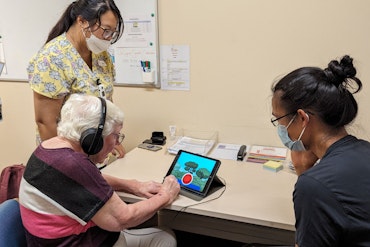The impact of sex on Alzheimer’s disease
Have you heard of estradiol?
![<p>Close to seven in 10 people with dementia have Alzheimer’s disease in Australia. [Source: Shutterstock]</p>](https://agedcareguide-assets.imgix.net/news/articles/wp/Alzheimerssex__1810.jpg?fm=pjpg&format=auto&w=550&q=65)
Close to seven in 10 people with dementia have Alzheimer’s disease in Australia. [Source: Shutterstock]
Key points:
- Alzheimer’s disease disproportionately affects women, who represent about two-thirds of those diagnosed with the late-onset type of the disease
- Features of Alzheimer’s disease are commonly classified into three stages — mild, moderate and advanced
- Anyone can develop Alzheimer’s disease, but it is more common in older age
Researchers from the University of Western Ontario have shown female sex hormones play a significant role in how Alzheimer’s manifests in the brain.
The new study, published in the Journal of the Alzheimer’s Association on October 17, was different from most studies of the human mind, in which the MRI scans of men and women are analysed together.
Western Professor Taylor Schmitz and graduate student Hayley Shanks analysed MRI brain scans and the rate of brain loss for aged men and women independently.
Previous research has shown Alzheimer’s is also more severe and progresses more rapidly in women and women with Alzheimer’s experience a steeper cognitive decline — loss of memory, attention and the ability to communicate and make decisions — compared to men with the disease.
Despite this, the differences between men and women with Alzheimer’s disease are generally a mystery, but the newly published research has revealed that estradiol, which is a form of the female sex hormone estrogen, could play a role.
Estradiol is used therapeutically to manage and treat post-menopausal symptoms, such as dysuria and for women who have had hysterectomies.
This study was led by graduate student Liliana German-Castelan, under the supervision of Vania Prado, who said she had become intrigued by similar tests conducted with mice.
“To understand how sex hormones play a role in Alzheimer’s, we need to study appropriate animal models. Unfortunately, most studies at this level still focus mainly on the male brain,” Professor Vania Prado explained.
When initially comparing the link between estradiol to Alzheimer’s disease in male and female mice, researchers noted that the female mice did not accurately reflect post-menopausal women.
Since Alzheimer’s disease is more common in women after menopause, new mice were brought in to closely replicate the sex differences in the age and factors of Alzheimer’s onset in humans.
Lead author and graduate student Liliana German-Castelan explained that by introducing mice that reflected post-menopause, scientists revealed the impact of estradiol on the build-up of toxic ‘beta-amyloid’ proteins, which cause Alzheimer’s disease.
“We found that when the sex hormone estradiol was present, the relationship between acetylcholine [the brain’s ‘messenger’ chemical] and toxic amyloid [protein build-up leading to Alzheimer’s] was lost, but when sex hormones were eliminated in the female mice that relationship reproduced the results seen in humans,” said German-Castelan
Researchers emphasised that if they hadn’t included female mice in the study, they might have missed crucial information about Alzheimer’s and sex differences.
“Our research emphasises the importance of using animal models that reflect, for instance, post-menopausal women, to understand how sex hormones influence Alzheimer’s pathology,” Prado said.
“Women and men respond differently to medications and have a somewhat different journey in Alzheimer’s.
“To develop more effective therapeutics, we need to study animal models that can reproduce different aspects of the journey. Sex hormones and estradiol levels are just one of these factors.”
Have you noticed differences in ageing and sex? Let the team at Talking Aged Care know the differences you’ve seen and subscribe to the Aged Care Guide newsletter for more information!























